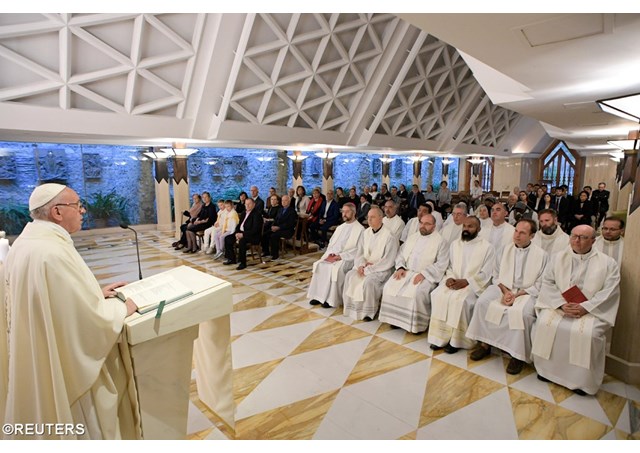
Pope at daily Mass: Draw near to those who suffer

(Vatican Radio) “Compassion,” “drawing near,” “to restore.” At the morning Mass at the Casa Santa Marta, Pope Francis prayed to the Lord, that He might give us “the grace” to have compassion for all those who are suffering; to draw near to these people in order to “take them by the hand” to restore them to the place of “dignity that God wills for them.”
The Holy Father was reflecting on the Gospel, from St Luke, which tells how Jesus raised the son of the widow of Naim from the dead. He explained how, in the Old Testament, the poorest of the slaves were precisely the widows, the orphans, the strangers and the foreigners. And the recurring invitation is to “care” for them, to ensure that they are inserted into and are part of society. Jesus is able “to see the details,” because He sees with the heart; He has compassion:
“Compassion is a sentiment that gets involved, it is a sentiment of the heart, of the viscera, it involves the whole person. It’s not the same as “pain,” or of [saying] “How sad, poor people!”: No, it’s not the same. Compassion gets involved. It is “suffering with.” This is compassion. The Lord is involved in the lives of a widow, of an orphan. “But say there” [people might say]… You have a whole crowd here, why don’t you talk to the crowd? Leave them… Life is like that… Those are tragedies that just happen…” No. For Him, that widow and that dead orphan were more important than the crowds He was speaking to and that were following Him. The Lord, with His compassion, was involved in this case. He had compassion.”
Compassion, then, pushes us “to draw near,” the Pope said: you can sometimes see many things, without necessarily drawing near to them. But, he said:
“Drawing near is touching the reality. Touching. Not looking at it from a distance. He had compassion—the first word. He drew near—the second word. Then He performs the miracle. Jesus does not say, ‘So long, I’m continuing on my way.’ No. He takes the child, and what does it say? ‘He restored him to his mother.’ To restore: the third word. Jesus performs miracles to restore, to return people to their proper place. And that is what He did with the redemption. He had compassion—God had compassion—He drew near to us in His Son, and He restored all of us to the dignity of children of God. He has re-created all of us.”
The exhortation is “to do likewise,” following the example of Christ, to draw near to the needy, not to help them “from a distance” because they might be dirty, or need a shower, or smell bad”:
“So often we see the news on TV, or the cover of the paper, the tragedies… ‘But look, in that country the children don’t have enough to eat; in that country the children are forced to be soldiers; in that country women are enslaved; in that country… Oh, what a calamity! Poor people…’ Many pages are written in the novel, in the TV shows that come after. And this is not Christian. And the question I ask now, looking at everyone, including myself, is, ‘Am I able to have compassion? To pray? When I see these things, that they bring to me at home, through the media… am I moved in the depths of my being? Does my heart suffer with those people; or do I feel pain, do I say, “Poor people,” and the like?’ And if you can’t have compassion, ask for the grace: ‘Lord, give me the grace of compassion.”
| All the contents on this site are copyrighted ©. |


